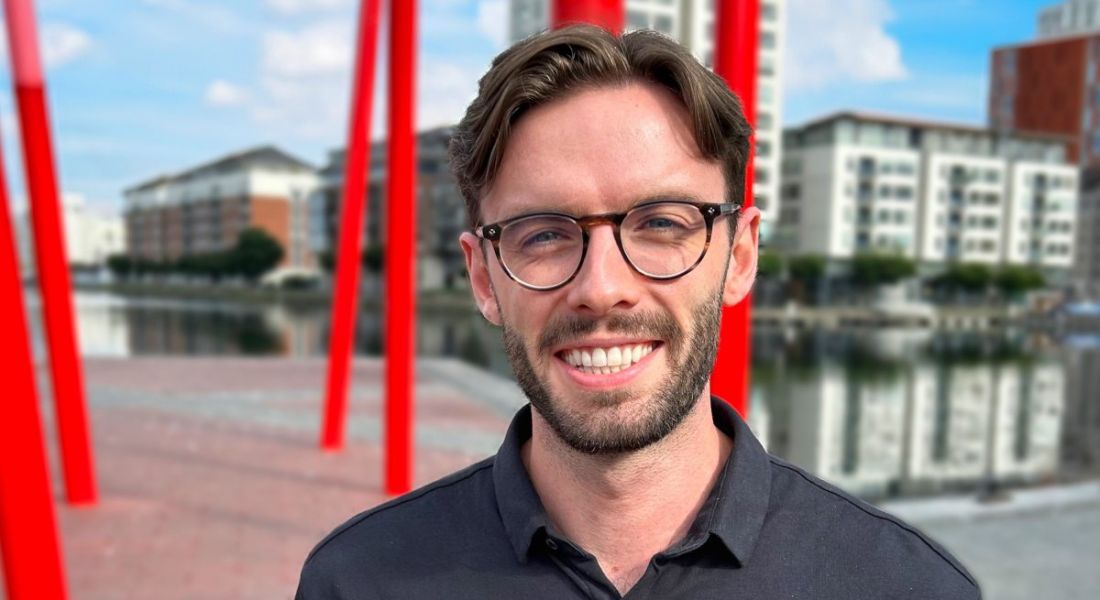Accenture’s Geoff Allen discusses his career pivot from philosophy to tech consulting, and the skills that unite the two areas.
Before embarking on a career in tech, Geoff Allen’s main pursuit was philosophy. This interest began in his teenage years, where he was constantly drawn to big philosophical questions about topics such as time and consciousness.
Allen built on this interest by pursuing it academically. He completed his bachelor’s degree in law with philosophy at University College Dublin and proceeded to obtain a master’s in history and philosophy of science at Utrecht University in the Netherlands. Allen also started his own philosophy podcast, Extrapolator, and is currently writing a pop philosophy book, which aims to explain complex philosophical ideas for a general audience.
Now, Allen works as a management consulting analyst at Accenture, a role which he said benefits from his podcasting and writing work.
“When I took my current role, the subject matter of my work pivoted from philosophy to tech.
“But podcasting and writing are exercises in communicating complex ideas, so it was good training for a career in tech consulting.”
What then made you decide to pivot away from your previous work and move into the tech world?
The career prospects! Studying philosophy prepares you (directly) for one career: academia.
I was strongly tempted by the idea of doing philosophy full-time – reading and teaching philosophy as my day job – and many of my master’s friends have taken that route.
But academia comes with its downsides. Early in your career, you’re forced to travel and bounce between temporary postings (‘postdocs’), so you have to want that lifestyle. I wanted job security and location security, so I looked for a long-term job that I would love, in Dublin.
How did you go about making that move?
I applied to Accenture in the final year of my master’s and joined as a graduate hire. I expected to be the only one without a background in business or technology, but I soon met colleagues who had studied music, politics, sociology, theoretical physics, maths and many other things.
A job at Accenture comes with an impressive amount of training, mentoring and networking. There are many learning paths to follow and you’re free to pursue your interests.
Faced with the risk of there being too much choice, everyone at every level is assigned a career counsellor, someone a few levels ahead of you in the business. My own career counsellor, Justin Schwering, has given me hugely valuable advice on which projects to pursue and what skills are most important for a career in tech strategy.
Tell me about your journey to the role you have now? What does that role entail?
Working in consulting, my day job changes drastically from month to month. That was the attraction. I’m placed on a new project every few months, helping companies from many different industries with many different functions.
I was encouraged to start my career as a generalist, rather than a specialist – to try as many options as possible before deciding what I like best. After working on several client projects, I found the kind of work I wanted to be doing – understanding user needs, analysing the impact of technology and advising how technology can improve ways of working.
As the consultant, I’m usually the intermediary between technical and non-technical groups. I convey information between the customer and the CTO, or between the users and the developers. I’m a translator. I don’t speak the full language of developers, but I understand enough to communicate a user’s needs back the development team. And I understand enough to manage the user’s expectations about which features can be built.
‘Knowing where to look or whom to ask is more important than knowing all the answers’
How does working in tech differ from your previous experience?
Doing philosophy and working in consulting are surprisingly similar, which is what drew me to my current role. Consultants are the philosophers of the technology world!
Philosophers are process experts who analyse the structure and method of argumentation. They can tell you how you’re arguing and how to improve it. Consultants are process experts, too, and they analyse the structure and method of organisations. They can tell you how you’re operating and how to improve it. We do a lot of work with tech companies helping them to fine-tune their operating models, and this operating model analysis is the same kind of thinking that we do in philosophy.
What were the most challenging elements of making a career pivot into tech and how did you navigate these challenges?
As soon as I moved into technology, I was confronted by many new concepts. It wasn’t just new words (like ‘architecture’, ‘serverless’ or ‘object-relational’) but rather the abstract ideas they represented. It was stimulating to see the world through new lenses like ‘technology architecture’ or ‘enterprise architecture’, but it took some mental energy. I studied these new topics and completed certifications with AWS (learning about the building blocks of cloud technology) and Scrum.org (learning about Agile software development).
And, after each one, I felt more confident talking to clients, since I could more easily speak the language of that world.
What do enjoy most about your job now and working in tech in general?
For sure, it’s the people I’ve met and worked with. Since joining Accenture, I’ve met hundreds of people. It’s like joining a village. Walking around an Accenture office, hundreds of people greet each other by name, and we mix a lot – on client projects, in the canteen, at virtual townhalls and at summer parties (which tend to be large).
What advice would you give to others considering a career pivot into tech? Is there anything in particular you wish you knew starting out?
Be enthusiastic to learn new concepts and get comfortable with not knowing things. My job is less about knowing things, and more about finding out or figuring it out.
I’ve often found myself staring at a paragraph or diagram with no idea what it means. It’s normal not to know things if you’re in a new industry, or if you’re pushing yourself to confront new, complex ideas. Knowledge networks are powerful. Knowing where to look or whom to ask is more important than knowing all the answers.
10 things you need to know direct to your inbox every weekday. Sign up for the Daily Brief, Silicon Republic’s digest of essential sci-tech news.




